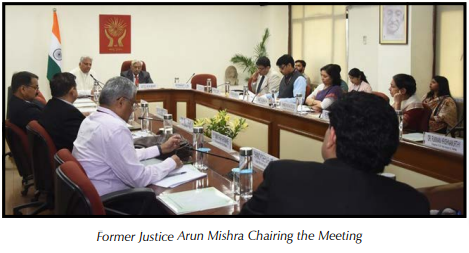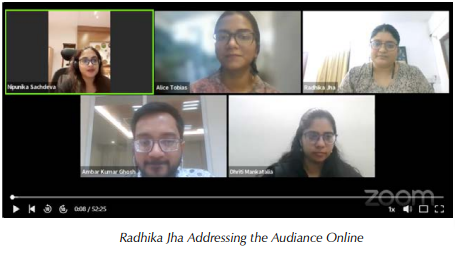Common Cause Events
NHRC Invites Common Cause to a Core Group Meeting on Criminal Justice System Reforms
On 23rd April 2024, the National Human Rights Commission (NHRC) invited Common Cause to a core group meeting on Criminal Justice System Reforms in India. The meeting in hybrid mode was chaired by the NHRC India Chairperson, Justice Arun Mishra in the presence of NHRC members, experts, academicians, representatives of civil society organizations and senior officers of the Commission.

Discussions included finding ways to address the delay in forensic reports, areas of improvement in the prosecution system, and the burking of offences. Common Cause director, Dr Vipul Mudgal presented the findings of the Status of Policing in India Report-2018 on the citizens’ trust and satisfaction in the police and its implications for the criminal justice system
The report reflects the ground reality of the citizens’ perceptions about policing in 22 states of india along with an analysis of the official data on the subject. Dr Mudgal cited data to highlight areas of inefficiency and insensitivities of the police. He said the SPIR reports brought out the point that the difference in the citizens’ trust and satisfaction levels becomes starker when one talks to the society’s vulnerable sections. It was important, he said, to examine the issues of police excesses and atrocities from the point of view of the poor and the excluded sections of society
The State of Youth Representation: Panel Discussion

On 8th May 2024, Ms Radhika Jha, Project Lead of of the Rule of Law programme, represented Common Cause at a well-attended online discussion on “State of Youth Representation: Young Candidates in the 2024 Indian Election.” The panel is part of the Centre for Youth Policy’s “18 Dialogues for the 18th Lok Sabha”. It was a series of conversations on the pivotal role of youth in shaping the 2024 general elections. She spoke on the day-today issues youth face, pointing out empirical data on unemployment as one of them.
The panel further discussed the challenges that the youth candidates in politics have to face. The dominance of dynasties in party politics is identified as one of the biggest challenges for newcomers to register their presence. Further, the role of digital media and its misuse in electoral politics by political parties was a talking point in the context of spreading hate speech, misinformation and disinformation. Radhika informed the panel about the efforts of Common Cause in association with other civil society partners to curb the misuse of social media during elections.
UGC Lecture on Policing and Human Rights at Jamia Millia Islamia
On 10th June 2024, Dr Vipul Mudgal addressed a batch of enthusiastic faculty members from different corners of the country and from multiple disciplines. The lecture was part of the 2-week refresher course in “Human Rights & Social Inclusion (Interdisciplinary). The event was organized by the Malviya Mission Teacher Training Centre, Jamia Millia Islamia, University under the aegis of the UGC. .
Dr Mudgal cited the findings of the Status of Policing in India Reports from 2018 to 2023, to explain the inadequacies of the police administration regarding their shortage of staff, and lack of training of police personnel etc. He further pointed out the facts and figures about the ingrained bias of police personnel against the marginalised sections of society.
The well-attended lecture concluded with an animated round of questions and answers. Later, the participants answered questions based on the SPIR reports as part of their evaluation.
Master Class on Evidence-Based Research to RCRC Faculty
On 3rd May 2024, Responsible Coalition for Resilient Communities (RCRC), an NGO working among marginalised rural communities, invited Common Cause Director Dr Vipul Mudgal to take a session on research training of the organisation’s team working in the field. The idea of the session was to acquaint the NGO workers with the basic features of ground-based research. The topic of the session was “Treading the Path of Evidence-Based Research: The Journey So Far & Beyond.”. The session was devoted to the romance of research and the fruits of data-based analysis for rational policymaking.
Unpacking India’s 2024 Lok Sabha Elections: Voter Sentiments and Future Trajectories
On June 13th 2024, the Asian Democracy Network (ADN), a pan-Asia partnership of civil society organisations working on strengthening democracy, invited Common Cause Director Dr Vipul Mudgal to a panel discussion on the outcomes of the recent Indian elections and their broader implications for democratisation in India and the wider region. Dr Kaustav Bandyopadhyay, Director of Participatory Research in Asia (PRIA), moderated the panel discussion.
The other participants of the panel discussion were Ms Meena Menon, President of Working Peoples’ Coalition, Dr Niranjan Sahoo, Senior Fellow, Observer Research Foundation, and senior journalist Ruhi Tiwari.
The key observations from the recent election results underscore several critical points. As Dr Mudgal observed, the election was fought against the backdrop of institutional dominance by the ruling party, extremely biased media and a massive mismatch in money and power between the two alliances. He also noted that the carefully cultivated image of Modi’s invincibility was shattered in these elections. He mentioned the use of publicly funded advertising campaigns run by the ruling party over a long period of time. He said the entire might of India’s mainstream media seemed to be with the ruling party and that things like the arrests of Opposition leaders and the freezing of the bank accounts of the principal opposition party also made a difference in favour of the ruling dispensation

The panel discussion focused attention on India’s democratic institutions and the role played by the Election Commission of India. The participants noted that the results also reflect a mature electorate capable of nuanced decision-making even amidst polarised campaigns. The importance of strong and independent regional leadership was validated beyond doubt with the BJP seeing success in states like Madhya Pradesh, Assam and Odisha contrasting with the failures observed in Rajasthan and Uttar Pradesh.
(Compiled by Tejaswini Kaktikar & Mrinank Bhartari Chandar, Interns at Common Cause)
Brainstorming Discussion with DIG Cybercrimes, UP
On April 9, 2024, a team of India Justice Report organised a discussion with Mr Pawan Kumar, DIG, Cybercrimes, Uttar Pradesh. The discussion was on the police capabilities pertaining to cybercrimes and the processes and infrastructure to deal with such crimes. The conversation helped arriving at indicators and data for further state-level analysis under the larger theme of cybercrime. Radhika Jha, project lead Rule of Law, Common Cause, joined the discussion as one of the organisers.
Press Conference on Shadow Advertisement
On April 16, 2024, the Global Coalition for Tech Justice organised a press conference on ringing the alarm bells about tech platforms’ failures to protect people and democracy during elections. The event included a discussion on the Indian elections and evidence collected by Ek?, the London Story and India Civil Watch International on shadow advertising, disinformation and hate speech on Facebook in India and Meta’s failure to curb this. Radhika Jha from Common Cause participated in the event as a steering committee member of the coalition.
Common Cause Files RTI with National Human Rights Commission
On May 24, 2024, the SPIR team of Common Cause filed an RTI application to procure information regarding cases of Human Rights violations in the context of policing in India. The components of the RTI were meant to inquire about the desegregation of the data on various heads that are clubbed in the commission’s annual reports throughtout its lifespan.



